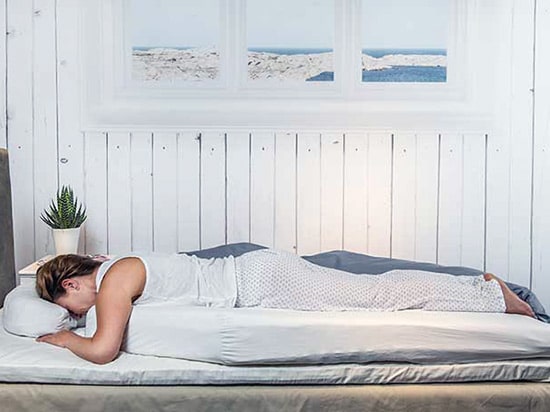
A unique bedding system developed by medical researchers in Sweden and Newcastle to help alleviate sleep apnoea and heavy snoring has shown promising results in clinical trials.

A unique bedding system developed by medical researchers in Sweden and Newcastle to help alleviate sleep apnoea and heavy snoring has shown promising results in clinical trials.
Hunter Medical Research Institute Director Professor Michael Nilsson, a neuroscientist and stroke rehabilitation researcher, collaborated with ear, nose and throat specialists Dr Armin Bidarian Moniri and Associate Professor Hasse Ejnell from Gothenburg’s Sahlgrenska University Hospital.
Their aim was to encourage people to sleep on their stomach (prone) or laterally on their side, rather than on their back (supine) which causes the pharynx, tongue and soft palate to obstruct the airway.
Around one in five adults experience a reduction (hypopnoea) or brief cessation of breathing, resulting in fragmented sleep. Current management guidelines recommend a Continuous Positive Airway Pressure (CPAP) mask or a mandibular splint, both of which have been proven effective but bring levels of discomfort.
The new mattress is layered with foam and angles inwards near the head to prevent rolling. The accompanying pillow is T-shaped to support the cheek and forehead while allowing a breathing recess and shoulder space.
In an article published in the British medical journal Acta Oto-Laryngologica, the research team found that more than half of the trial participants using the new mattress reduced their apnoea/hypopnoea episodes by at least 50 per cent.
Average time spent in the supine position decreased from 142 minutes to less than a minute, while average time in the prone position rose to almost six hours.
“My involvement in this project resulted from discussions about the importance of sleep for cognitive performance,” Professor Nilsson said. “We know that sleep is the key to recovery for the central nervous system, and poor sleeping patterns along with other factors can increase the risk of stroke, cardiovascular disease, dementia, diabetes and other diseases.
“From a stroke rehabilitation perspective, the lack of sleep or disturbed sleep in the recovery phase is potentially a very important problem that has been insufficiently researched.”
Professor Nilsson says the new mattress will require changes in people’s sleeping behaviour, however the study participants adjusted after several nights and found it very comfortable.
“The results show equivalent or better results than the CPAP for patients with mild to moderate sleep apnoea so we are planning broader trials and will endeavour to have the mattress classified as a medical device for use in acute-care hospital wards.”
While the mattress is yet to be available in Australia, a commercial version called Restme is now available through Sängjätten bedding stores in Sweden.
* Data analysis for the trial was provided by Professor John Attia, co-director of HMRI’s CReDITSS (Clinical Research Design, IT, and Statistical Support) Unit. HMRI is a partnership between the University of Newcastle, Hunter New England Health and the community.
HMRI would like to acknowledge the Traditional Custodians of the land on which we work and live, the Awabakal and Worimi peoples, and pay our respects to Elders past and present. We recognise and respect their cultural heritage and beliefs and their continued connection to their land.
Hunter Medical Research Institute
We’re taking healthy further.
Locked Bag 1000
New Lambton
NSW, Australia, 2305


This site is protected by reCAPTCHA and the Google Privacy Policy and Terms of Service apply.
Copyright © 2024 Hunter Medical Research Institute | ABN: 27 081 436 919
Site by Marlin Communications
